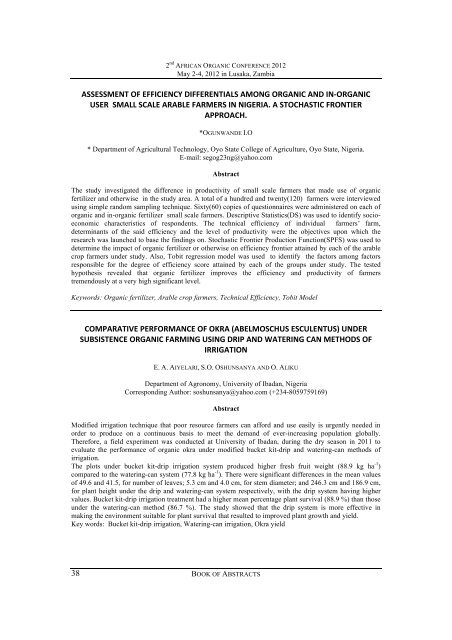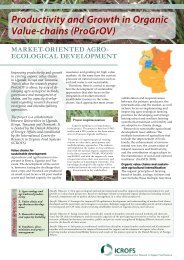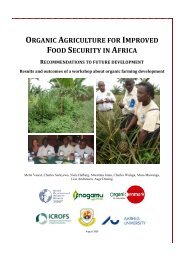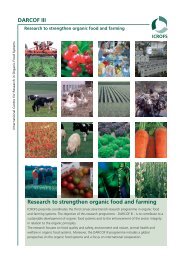The 2nd African Organic Conference â Mainstreaming ... - ICROFS
The 2nd African Organic Conference â Mainstreaming ... - ICROFS
The 2nd African Organic Conference â Mainstreaming ... - ICROFS
You also want an ePaper? Increase the reach of your titles
YUMPU automatically turns print PDFs into web optimized ePapers that Google loves.
2 nd AFRICAN ORGANIC CONFERENCE 2012<br />
May 2-4, 2012 in Lusaka, Zambia<br />
ASSESSMENT&OF&EFFICIENCY&DIFFERENTIALS&AMONG&ORGANIC&AND&IN:ORGANIC&<br />
USER&&SMALL&SCALE&ARABLE&FARMERS&IN&NIGERIA.&A&STOCHASTIC&FRONTIER&<br />
APPROACH.&<br />
*OGUNWANDE I.O<br />
* Department of Agricultural Technology, Oyo State College of Agriculture, Oyo State, Nigeria.<br />
E-mail: segog23ng@yahoo.com<br />
Abstract<br />
<strong>The</strong> study investigated the difference in productivity of small scale farmers that made use of organic<br />
fertilizer and otherwise in the study area. A total of a hundred and twenty(120) farmers were interviewed<br />
using simple random sampling technique. Sixty(60) copies of questionnaires were administered on each of<br />
organic and in-organic fertilizer small scale farmers. Descriptive Statistics(DS) was used to identify socioeconomic<br />
characteristics of respondents. <strong>The</strong> technical efficiency of individual farmers’ farm,<br />
determinants of the said efficiency and the level of productivity were the objectives upon which the<br />
research was launched to base the findings on. Stochastic Frontier Production Function(SPFS) was used to<br />
determine the impact of organic fertilizer or otherwise on efficiency frontier attained by each of the arable<br />
crop farmers under study. Also, Tobit regression model was used to identify the factors among factors<br />
responsible for the degree of efficiency score attained by each of the groups under study. <strong>The</strong> tested<br />
hypothesis revealed that organic fertilizer improves the efficiency and productivity of farmers<br />
tremendously at a very high significant level.<br />
Keywords: <strong>Organic</strong> fertilizer, Arable crop farmers, Technical Efficiency, Tobit Model<br />
COMPARATIVE&PERFORMANCE&OF&OKRA&(ABELMOSCHUS&ESCULENTUS)&UNDER&<br />
SUBSISTENCE&ORGANIC&FARMING&USING&DRIP&AND&WATERING&CAN&METHODS&OF&<br />
IRRIGATION&<br />
E. A. AIYELARI, S.O. OSHUNSANYA AND O. ALIKU<br />
Department of Agronomy, University of Ibadan, Nigeria<br />
Corresponding Author: soshunsanya@yahoo.com (+234-8059759169)<br />
Abstract<br />
Modified irrigation technique that poor resource farmers can afford and use easily is urgently needed in<br />
order to produce on a continuous basis to meet the demand of ever-increasing population globally.<br />
<strong>The</strong>refore, a field experiment was conducted at University of Ibadan, during the dry season in 2011 to<br />
evaluate the performance of organic okra under modified bucket kit-drip and watering-can methods of<br />
irrigation.<br />
<strong>The</strong> plots under bucket kit-drip irrigation system produced higher fresh fruit weight (88.9 kg ha -1 )<br />
compared to the watering-can system (77.8 kg ha -1 ). <strong>The</strong>re were significant differences in the mean values<br />
of 49.6 and 41.5, for number of leaves; 5.3 cm and 4.0 cm, for stem diameter; and 246.3 cm and 186.9 cm,<br />
for plant height under the drip and watering-can system respectively, with the drip system having higher<br />
values. Bucket kit-drip irrigation treatment had a higher mean percentage plant survival (88.9 %) than those<br />
under the watering-can method (86.7 %). <strong>The</strong> study showed that the drip system is more effective in<br />
making the environment suitable for plant survival that resulted to improved plant growth and yield.<br />
Key words: Bucket kit-drip irrigation, Watering-can irrigation, Okra yield<br />
38<br />
BOOK OF ABSTRACTS





